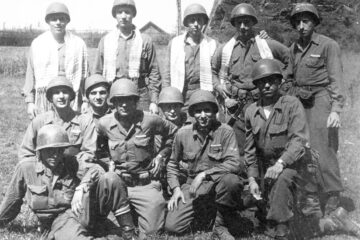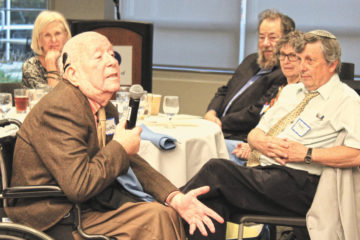God & Bible focus of Ryterband lectures
By Michele Alperin, Special To The Dayton Jewish Observer

Ask American Jews about the origins of monotheism, and the first thing that probably comes to mind is the midrashic story of Abraham breaking idols in his father’s house. But Bible scholar Richard Elliott Friedman, professor of Jewish Studies at the University of Georgia, explores a combination of sociological and psychological understandings of what this transformation meant in people’s lives. He leverages his study of biblical text and archeological evidence to tell this story.
Rather than relying on a midrashic tale seeking to explain why Abraham came to believe in a single God that he followed to a new land, Friedman instead asks, “What really happened?” adding, “We are at a point where we can really address that.”
Friedman is the keynote speaker for this year’s Ryterband Symposium, a collaboration of Wright State University, United Theological Seminary, and the University of Dayton.
Though scholars argue over whether monotheism began early or late in the biblical period, that’s not the topic of his upcoming lectures. He asks instead, “Whenever it was that it started, how did that change work in the first generation?”
What interests him is how that transformation from multiple gods to one God played out in the first generation. Did parents tell their child, “Well, honey, there’s only one God?” he asks. And what was their attitude over what had come before? “If grandma still believed in lots of gods, did that mean grandma was bad? In the beginning they believed in other gods — what did they think happened to them? Did they use to live and are now dead?”
Bible study has been a lifelong endeavor for Friedman, starting as a preteen. “I had a rabbi, and I would stay with him every Saturday afternoon, and we studied Chumash (Torah) and Rashi for 10 years. It was an amazing gift,” he says.
Early on he equated a career in Bible study with the rabbinate, and he attended the Jewish Theological Seminary for three years. But at some point, he says, “it became a greater joy to me just to do scholarship.”
He left the seminary with a master’s in Hebrew literature and went to Harvard University, where he earned a doctorate in Hebrew Bible and Near Eastern Languages and Civilizations in 1978. His teaching career has spanned 30 years at the University of California, San Diego, and another six at the University of Georgia.
Although Friedman chose to leave the seminary for academia, he has maintained a strong relationship with rabbis and loves to teach them. While in San Diego, he did so before each of the meetings of the San Diego Rabbinical Association. “The thing I prize most in my career is that rabbis want me to come and teach them,” he says.
Friedman has also been a prolific writer, another form of teaching. Who Wrote the Bible? — which draws on the biblical and archeological evidence to understand the identities of the authors of the books of the Torah and to paint a picture of that world — is perhaps his best-known book.
In recent years Friedman has changed direction to focus more on connecting the Bible to modern life. His most recent book, The Bible Now, which he wrote with Shawna Dolansky, relates the Bible to contemporary issues of abortion, homosexuality, capital punishment, women’s status, and the earth.
He is working on a book to connect biblical Israel to present realities in the state, claiming the issues playing out today in Israel cannot be understood without going all the way back.
He is particularly concerned with minimalist biblical scholarship, largely in Europe, which claims that none of the events in the Bible happened. “No David, no kings, no biblical Israel, and that Israel is a fiction,” he says.
This is in the face of archeological evidence establishing the ancient Israelites’ presence in the land. For instance, the vast majority of inscriptions are in Hebrew.
Even food testifies to the Israelites’ presence. “Why in all the Israelite layers are there no pork bones and in the Canaanite layers there are pork bones?” he asks.
“There is a tremendous battle going on now, and the stakes are the Jews’ claim to Israel,” he says. “I’m arguing that everything that was really important, the Jewish connection to Israel, its language and values, all was there. To write off the first third of a people’s life is ridiculous.”
Dr. Richard Elliott Friedman at United Theological Seminary, 4501 Denlinger Rd., Trotwood on Monday, Oct. 15. 3:30 p.m.: The World’s First Great Writers or Nobody Believes That Anymore. 7:30 p.m.: The Death of Gods, Birth of Monotheism & Disappearance of God. Free. For more information, call Wright State University Prof. Mark Verman, 775-2461.





